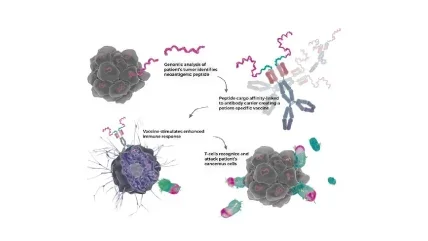
Researchers at Uppsala University and KTH Royal Institute of Technology in Sweden have developed a new antibody treatment with the potential to treat several types of cancer.
They developed a new form of precision medicine by combining three different functions in the antibody, which enhances the effect of T cells on the cancer tumour.
The unique antibody delivers a therapeutic agent directly to cancer cells and activates the immune system for personalised immunotherapy.
It specifically targets neoantigens, unique mutations found only in cancer cells, by delivering tumour-specific material to specialised immune cells.
The antibody has been shown to activate certain types of immune cells in human blood samples and has shown promising results in animal models.
The treatment prolonged survival in mice at higher doses and cured cancer in some, indicating it is safer than previous cancer therapies studied by the researchers.
The research is supported by the Swedish Cancer Society, the Knut and Alice Wallenberg Foundation, Vinnova and Strike Pharma, among others.
In the study, the new antibody showed that it can be customised for each patient, strengthening the immune system against cancer.
The study was led by Uppsala University Department of Pharmacy professor Sara Mangsbo and KTH Royal Institute of Technology professor Johan Rockberg.
Sara Mangsbo said: “We have been researching precision medicine for close to 15 years now, as well as how we can use antibodies to influence an important key protein (CD40) in the immune system. We can now show that our new antibody method works as precision medicine for cancer.”
Johan Rockberg said: “The advantage of our drug is that it is easy to produce on a larger scale, yet can be easily tailored to the patient’s disease or specific tumour.
“The medicine consists of two parts that are combined, a targeting bispecific antibody – which can be produced in large quantities in advance – and a custom peptide part, which is produced rapidly synthetically on a small scale for a desired type of cancer.
“Both in terms of production cost and the short time it takes to tailor a peptide to a new tumour, this increases availability and should make it quicker for patients to go from diagnosis to treatment.”






